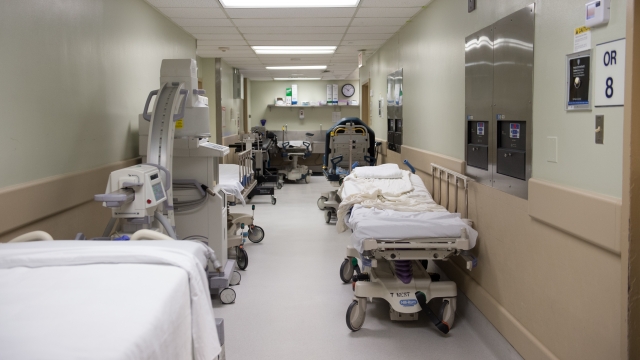There's a special kind of patience someone waiting for a kidney transplant has. Most wait three years or more. Charlotte Smith waited five for hers.
"Many people think that the first call that comes is actually the one where you get the kidney, and that's not necessarily the case. So I received actually three calls before I actually received the kidney from a live donor,"
As of June 20, a total of 88,716 people are waiting for a kidney transplant in the United States. More than 27,000 of those patients are Black. Now, some Black kidney transplant candidates are getting credit for years of time they should have been on the waiting list, but were kept off because of race.
"I went from being officially on the list as of January 27, 2023, and they backdated to December 14, 2017," Katherine Anderson of Norristown, Pennsylvania, told Scripps News. "Why? That — that's my question. Why did it have to be the way that it is?"
Last year, federal health officials got rid of a decades-old formula that included a factor for race to calculate kidney function. It's called the estimated glomerular filtration rate, or eGFR. Kidneys filter out waste through urine. The less healthy a person's kidney, the more waste that goes in the blood and the higher the eGFR. The average eGFR for a healthy 40-year-old is 99, or 99 milliliters per minute. When a patient's eGFR is 20 or less they're eligible for transplant.
But the old race-based eGFR would falsely diagnose a Black patient's kidney function, wrongfully showing it was filtering better than it actually was. It's even more troubling because experts say high rates of diabetes, obesity, high blood pressure, and heart disease increase the risk of kidney failure in the Black community.
SEE MORE: How does the organ transplant system work?
"Many patients, particularly Black Americans, end up with kidney failure being discovered in the emergency room for the first time rather than being prepared for kidney failure over months or years," said Dr. Neil Powe, who is among those who fought and helped develop a more equitable eGFR formula.
Also among them is nephrologist Dr. Cynthia Delgado. Both told Scripps News this move was a long time coming.
"Race should not have a role in determining how healthy a kidney patient is," said Delgado.
In January, the Organ Procurement and Transplantation Network (OPTN) and the United Network for Organ Sharing(UNOS) told the 231 U.S. hospitals with kidney transplant programs they also needed to go back through their wait lists and give Black patients credit for time they were shorted.
"With the change now in the eGFR, it means that I would have actually been able to start dialysis sooner. And even more importantly, I would have been able to receive my transplant sooner," Smith said.
Under the new policy, hospitals are required to send letters to all their kidney transplant candidates to let them know about the change. Plus, there is a second letter telling Black patients if they've been given credit for more time. Hospitals also have to send proof to UNOS they've completed their reviews.
UNOS tells Scripps News at least 5,000 patients have gotten credit for time (as of late June). Roughly only 4% of the 231 kidney transplant centers have completed their reviews.
"You have to be really like a detective," said Dr. Pooja Singh, medical director of kidney and pancreas transplantation at Jefferson Health Nicoletti Kidney Transplant Center.
SEE MORE: Why does the government want to change the organ transplant system?
The back-timing includes a long, painstaking process of sifting through years of charts and patient health records. Hospitals need to find instances in which the race-based eGFR was used and came up with scores over 20, and show that with race-neutral math the scores were actually under 20.
"We have thousands of patients kind of navigating the transplant pathway. For some patients who are on dialysis and they've had a long waiting time already, gaining some additional small amount of time may not create much of a difference for them because they've already accumulated enough time," Dr. Amishi Desai, a transplant nephrologist with Northwestern Medicine said.
"Based on the size of your program, if you are a really small program with, you know, 100, 150 odd patients versus a medium sized program like us that is 650, versus is a huge program ... it can be a really daunting process," Singh says, adding that her team has spent personal time tracking down patients, including the transplant surgeons. So far, they've adjusted time for more than 170 Black patients.
"I was just shocked when I started to see six years, seven years, eight years of time. It was mind boggling to me," she said.
"I was excited. But then I was confused. Then I was hurt," Anderson explains. She went on the transplant list in January. Two months later, she got credit for more than five years. It's particularly emotional because growing up, her mother waited years for a kidney transplant. She has a sister who has also had a transplant.
"I thought about my mom, my sister, friends that passed away, family members that passed away that could have been transplanted before they passed away. And it just seemed so unfair. It just seems so unfair."
Anderson now is on standby mode, thinking about what she would be able to do with better kidney function.
"Walking around the block. Just grocery shopping, without taking breaks. Just normal stuff that will be, like, amazing to me, " she said.
The deadline for transplant centers to comply with this new policy is January 2024. Hospitals we spoke with say they'll continue to check for back credit of time for new Black kidney transplant patients as well.
SEE MORE: First pill for fecal transplants wins FDA approval
Trending stories at Scrippsnews.com




